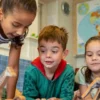![Unlocking Brilliance: 5 Powerful Ways Hermitage Hills Day School Ignites Young Minds Introduction: The Imperative of Early Brilliance At Hermitage Hills Day School, early education is approached with a reverence that acknowledges its unparalleled impact on a child’s lifelong trajectory. The formative […]](https://dayschools.org/hermitage/wp-content/uploads/sites/5/2025/05/Day-School-8.webp)
Table of Contents
Introduction: The Imperative of Early Brilliance
At Hermitage Hills Day School, early education is approached with a reverence that acknowledges its unparalleled impact on a child’s lifelong trajectory. The formative years are not viewed as a prelude to “real learning” but as the defining chapter where foundational skills, values, and cognitive architecture are built. In this enriched environment, children are not simply enrolled—they are purposefully nurtured, guided, and challenged to explore the full range of their emerging capacities. The school serves as both a sanctuary and a catalyst, creating the conditions necessary for intellectual and emotional awakening.
The underlying philosophy rests on a core belief: brilliance is not reserved for the exceptional few, but is a latent force within every child, waiting for the right conditions to emerge. By surrounding children with educators who are skilled observers and intentional facilitators, and by equipping classrooms with provocative, developmentally appropriate materials, Hermitage Hills Day School cultivates this brilliance with care and precision. The school doesn’t merely transmit knowledge—it inspires transformation. Children leave each day not just knowing more, but understanding more deeply who they are and what they can become.
The built environment itself reflects this commitment. Learning spaces are calm yet vibrant, thoughtfully arranged to foster both autonomy and collaboration. Natural light, organic materials, and flexible work areas encourage exploration and calm focus. The curriculum is deliberately interdisciplinary, inviting learners to connect ideas across subjects and contexts. This is not a setting defined by worksheets and rigid pacing guides; it is a living, breathing ecosystem for whole-child development. Here, brilliance is not a goal to reach—it is a natural outcome of meaningful, mindful education.
Tailored Learning Frameworks for Holistic Development
Hermitage Hills Day School approaches education with the understanding that uniformity and true learning rarely coexist. Each child brings to the classroom a distinct constellation of strengths, struggles, interests, and developmental milestones. Recognizing this, the school adopts individualized learning frameworks that allow educators to respond with nuance and flexibility. Rather than rushing students through rigid benchmarks, teachers are empowered to observe, interpret, and respond in real time—making learning personal, relevant, and effective.
The tools for customization are both sophisticated and empathetic. Educators use developmental checklists to track progress across cognitive, linguistic, physical, and socio-emotional domains. Portfolios filled with student work samples, learning stories, and observational notes provide a rich narrative of each learner’s evolution. Weekly reflection journals help students articulate their thought processes, while also giving teachers insight into emerging patterns and preferences. This multi-source data enables instruction to be both informed and intuitive, challenging students without overwhelming them.
What elevates this model further is its integrated approach to child development. Academic content is never isolated from emotional intelligence or social capacity. A math lesson might involve collaborative problem-solving, fostering not only numeracy but also teamwork and communication. Literacy tasks might draw from student experiences, encouraging self-expression and identity formation. These tailored frameworks ensure that learning is never mechanical—it is always multidimensional. At Hermitage Hills Day School, education is designed not to standardize children, but to support the beautiful variance of how they grow.

Play as a Pedagogical Powerhouse
At Hermitage Hills Day School, play is elevated from pastime to pedagogical cornerstone. The school’s philosophy positions play as a rich and vital context for cognitive, emotional, and social growth. Far from being an unstructured filler between “real” lessons, play is meticulously designed to serve intentional learning outcomes. Every block, costume, and art supply serves as a conduit for constructing knowledge. In this environment, children make sense of the world not through passive instruction, but through active manipulation, storytelling, experimentation, and discovery.
Classrooms resemble interactive laboratories, each brimming with provocations that stimulate curiosity and inquiry. A child stacking blocks isn’t just entertaining themselves—they’re encountering basic engineering principles, grappling with spatial awareness, and practicing precision. In the role-play corner, when students simulate a veterinary clinic or grocery store, they are engaging in narrative development, vocabulary acquisition, and symbolic thinking. These immersive experiences sharpen executive function, encourage cooperative problem-solving, and reinforce content knowledge through embodied learning.
Educators act as facilitators rather than directors of play. Their role is nuanced: knowing when to observe quietly, when to offer a scaffold, and when to ask a question that stretches a child’s thinking just a bit further. This approach respects the integrity of child-led exploration while subtly guiding it toward deeper understanding. The outcome is a learning environment where children are not only school-ready but life-ready—brimming with creativity, confidence, and the cognitive dexterity needed for an ever-changing world.
Emotional Literacy as a Core Curriculum
Hermitage Hills Day School treats emotional development not as a sidebar to academics, but as its central axis. The capacity to name, understand, and regulate emotions is woven into every part of the day, creating an environment where children learn not only how to think, but how to feel responsibly and empathetically. Emotional literacy here is systematic and explicit: children are taught emotional vocabulary alongside their ABCs and guided in real-time through the nuance of interpersonal dynamics.
These practices are embedded seamlessly into the school’s daily rituals. Each morning begins with group check-ins where students express how they’re feeling and why. Visual tools like emotion charts and mood meters give even the youngest learners a language for self-awareness. Throughout the day, reflection journals, storytelling, and quiet mindfulness exercises provide moments for introspection and recalibration. Even conflict resolution becomes a teachable moment—disagreements are addressed through restorative dialogues rather than punitive measures, emphasizing accountability, empathy, and reconciliation.
The benefits of this emotional fluency are far-reaching. Students who can articulate their internal states are better equipped to navigate frustration, manage impulsivity, and show compassion to peers. These children are more collaborative in group settings, more focused in learning tasks, and more adaptable when facing challenge. The school’s holistic approach to emotional intelligence prepares students not just for academic success but for interpersonal resilience and lifelong mental wellness. Emotional brilliance, at Hermitage Hills Day School, is as celebrated and cultivated as any academic milestone.
Nature Immersion and Sensory-Rich Learning
Nature is not a backdrop at Hermitage Hills Day School—it is a vibrant and dynamic co-teacher. The school embraces nature immersion as a fundamental pillar of its educational model, integrating outdoor learning into the rhythm of each day. The outdoor environment is treated with intentionality, transforming gardens, trails, and open-air classrooms into multisensory spaces where science, art, and mindfulness converge. Children are encouraged to engage with their surroundings using all five senses, fostering neural development and deepening environmental literacy.
In the school’s garden, children do more than plant seeds—they learn about life cycles, sustainability, and delayed gratification. Weather logs turn meteorological observations into data-driven inquiry. Mud kitchens and water stations provide unstructured but deeply meaningful experiences in cause and effect, cooperation, and experimentation. Seasonal changes are embraced as curriculum anchors, giving context to studies of habitats, animal behavior, and environmental change. These sensory-rich experiences lay the groundwork for robust conceptual understanding and a reverent connection to the earth.
Beyond academic integration, nature-based learning serves an equally crucial role in emotional regulation and physical wellness. The outdoor environment allows for expansive movement, reducing stress and increasing focus. The natural world’s unpredictability teaches adaptability and fosters a spirit of wonder. Through this approach, students at Hermitage Hills Day School not only develop intellectual capacities but also a deep-seated sense of belonging to a world much larger than themselves. Nature, in this context, becomes both sanctuary and stimulus—a place where curiosity thrives and the soul is nourished.

STEAM Integration for 21st Century Readiness
Hermitage Hills Day School embraces the complexity of the modern world by introducing children early to STEAM—Science, Technology, Engineering, Arts, and Mathematics—in ways that are accessible, meaningful, and deeply engaging. Rather than treating these disciplines as isolated silos, the school fuses them into thematic learning experiences that mirror how knowledge is applied in real life. This interdisciplinary approach nurtures a mindset attuned to innovation, systems thinking, and adaptive reasoning—traits essential for thriving in a rapidly evolving global landscape.
Hands-on exploration lies at the core of the school’s STEAM methodology. Through simple machines, children encounter physical science concepts like force and motion. Mathematics is integrated through activities like pattern creation, measurement in cooking projects, and spatial problem-solving in construction tasks. Meanwhile, the arts are never an afterthought—they are deliberately integrated to strengthen design aesthetics, storytelling, and emotional expression. This synergy of creative and analytical domains leads to balanced and flexible thinkers.
Perhaps most critically, STEAM instruction at Hermitage Hills Day School reinforces the importance of iteration and resilience. Children learn that a failed experiment is not the end but an invitation to refine and try again. They hypothesize, test, observe, and revise—developing not only academic skills but also tenacity and intellectual humility. In a world where adaptability, originality, and lifelong learning are prerequisites for success, this early exposure to STEAM disciplines equips children with both the mindset and the skill set to become the innovative problem-solvers of tomorrow.
Cultivating a Culture of Psychological Safety
A truly effective learning environment must prioritize psychological safety as much as it does academic instruction. Hermitage Hills Day School understands that intellectual risk-taking and authentic expression flourish only in spaces where children feel emotionally secure and respected. The school creates such a climate through predictable routines, nurturing relationships, and a culture of empathy that affirms every student’s identity and voice. Safety is not treated as a background condition—it is the foreground in which all meaningful learning is rooted.
This commitment begins with the staff, who are trained in trauma-informed practices, attachment theory, and social-emotional development. Teachers recognize that behavior is often communication and respond with curiosity rather than judgment. When a child struggles, the emphasis is on regulation, not reprimand. Restorative conversations replace punitive consequences, guiding students to reflect, repair, and reintegrate. This approach ensures that children are not labeled by their missteps but are supported through them with dignity and care.
Within this safe ecosystem, students feel emboldened to ask questions, voice ideas, and take creative risks. They know they will be met with encouragement rather than criticism. They learn to trust not only the adults around them but also their own instincts and capacities. The result is a classroom culture where learning is not performative but genuine—where brilliance surfaces not from fear of failure, but from the confidence that comes with being truly seen and valued.
The Role of Teacher as Curator of Curiosity
At Hermitage Hills Day School, teaching is viewed as an art form—one that demands keen observation, responsive creativity, and a deep belief in children’s capabilities. Educators do not merely present information; they orchestrate experiences that provoke thought, emotion, and inquiry. Lessons begin not with rote instruction, but with provocations—an intriguing question, an unfamiliar object, or a compelling story—that invite exploration. This strategy transforms the classroom into a space of co-discovery, where students and teachers learn alongside one another.
Teachers are attuned to the subtle cues of student interest. They document conversations, watch how children engage with materials, and respond by shaping curriculum around those curiosities. A spontaneous discussion about bridges might evolve into an engineering unit featuring literature, math concepts, and hands-on model-building. This emergent approach ensures that learning remains relevant and alive, rooted in the authentic passions of the children themselves. The teacher’s role is to scaffold understanding, supply resources, and make connections—never to dominate the learning journey.
By honoring each child’s questions and ideas, Hermitage Hills Day School cultivates a deep sense of agency. Students learn that their thinking matters, that inquiry is a worthy pursuit, and that their classroom is a place where curiosity is not only welcomed but celebrated. This model doesn’t just build knowledge—it builds confidence, autonomy, and an enduring love of learning. Through this lens, the teacher is more than an instructor; they are a catalyst for wonder, guiding children toward becoming thoughtful, self-directed learners for life.
Fostering Family Engagement as a Strategic Advantage
Hermitage Hills Day School operates with the conviction that families are not spectators in a child’s education—they are strategic partners. From the outset, parents and caregivers are invited into a collaborative relationship built on mutual respect and shared purpose. Their unique knowledge of their child’s personality, history, and home life is treated as essential data, enriching the school’s understanding and response to each learner. This partnership model transforms education from a segmented experience into a seamless extension of the child’s life.
The mechanisms for family involvement are both frequent and meaningful. Weekly communications from teachers outline current learning themes, individual progress, and opportunities for reinforcement at home. Classroom doors are open for observation, participation, and celebration—whether through reading sessions, learning showcases, or cultural events. Parent enrichment seminars address key developmental topics, equipping caregivers with practical tools and shared language to support their children beyond the classroom. These touchpoints create an ongoing dialogue that builds transparency, trust, and unity.
This home-school synergy strengthens the entire educational ecosystem. When children see their parents and teachers aligned, they experience a powerful sense of consistency and affirmation. Expectations are reinforced across contexts, and the child is supported by a community that speaks with one voice. The emotional security that results from this harmony encourages risk-taking, resilience, and responsibility. At Hermitage Hills Day School, family engagement isn’t a program—it’s a philosophy that transforms learning into a shared journey of discovery.

Evaluating Progress Through Multi-Dimensional Assessment
Hermitage Hills Day School reimagines assessment as a holistic, human-centered process. Rather than reducing children to test scores or percentile ranks, the school uses an expansive set of tools to capture the full breadth of student growth. Assessment becomes less about benchmarking and more about storytelling—a dynamic portrait of how a child is learning, interacting, adapting, and evolving over time. The goal is not comparison, but comprehension: to understand each child deeply and to respond with intention.
Assessment methods include curated portfolios, developmental checklists, narrative reflections, and authentic performance tasks. Teachers observe students in real contexts, documenting moments of insight, collaboration, and perseverance. Children present their projects and explain their thinking in exhibitions of learning, building metacognitive skills and confidence. These presentations are not only for show—they are integral checkpoints where students articulate their understanding and educators gain rich insight into cognitive and emotional development.
By de-emphasizing high-stakes testing, Hermitage Hills Day School creates space for authenticity and self-awareness. Children are evaluated not just for what they can recall, but for how they apply knowledge, solve problems, express themselves, and relate to others. This multi-dimensional model of assessment affirms each child’s strengths while gently illuminating areas for growth. It fosters a learning culture where progress is measured in depth, not speed; in substance, not surface. In doing so, the school prepares children for a world where adaptability, communication, and reflection are as vital as content knowledge.
Conclusion: Building Lifelong Learners from the Ground Up
Hermitage Hills Day School is more than an educational institution—it is a vibrant ecosystem of learning, character-building, and empowerment. Every hallway, classroom, and outdoor space pulses with purpose. The school is a sanctuary where curiosity is honored, mistakes are welcomed as part of growth, and every child’s potential is nurtured with unwavering dedication. Within this environment, students are not shaped to fit a mold—they are given the tools, encouragement, and space to become their truest selves.
Brilliance at Hermitage Hills Day School is not treated as a rare trait but as a natural outcome of meaningful, intentional education. The school does not merely prepare children for the next academic step; it shapes thinkers, builders, and empathetic citizens ready to contribute thoughtfully to the world around them. Through its commitment to whole-child development, inquiry-driven learning, and emotionally responsive teaching, Hermitage Hills Day School lights a fire that lasts far beyond the preschool years.
This enduring impact is evident in the confidence with which students navigate both challenges and opportunities. They leave not only with strong foundational skills but with a mindset of curiosity, empathy, and resilience. The future they step into is uncertain, but they are ready—because they have been taught not just what to learn, but how to learn, how to care, and how to lead. In this way, Hermitage Hills Day School truly does more than educate—it illuminates lives






